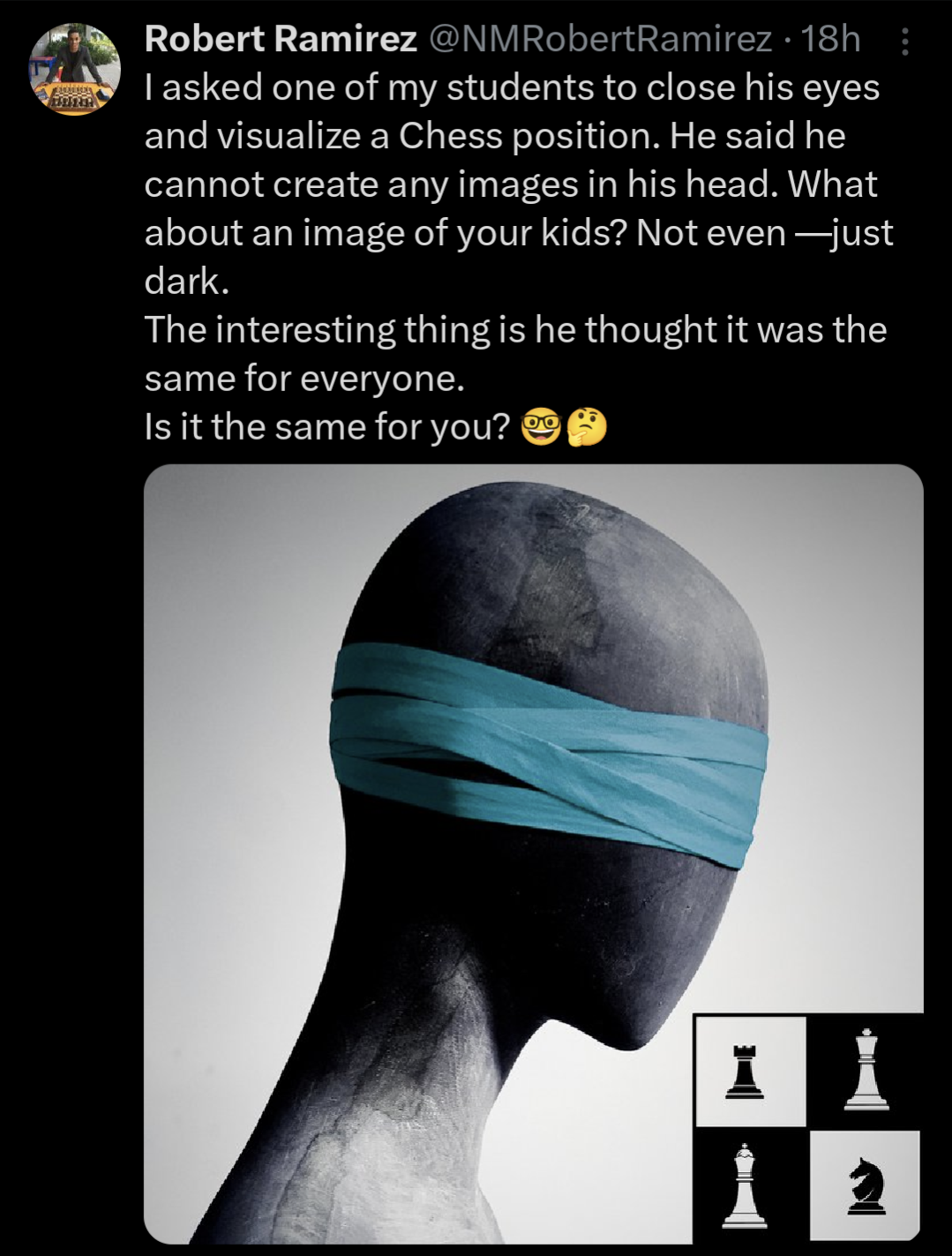this post was submitted on 17 Apr 2024
147 points (94.0% liked)
Chess
2008 readers
2 users here now
Play chess on-line
FIDE Rankings
| # | Player | Country | Elo |
|---|---|---|---|
| 1 | Magnus Carlsen | 🇳🇴 | 2839 |
| 2 | Fabiano Caruana | 🇺🇸 | 2786 |
| 3 | Hikaru Nakamura | 🇺🇸 | 2780 |
| 4 | Ding Liren 🏆 | 🇨🇳 | 2780 |
| 5 | Alireza Firouzja | 🇫🇷 | 2777 |
| 6 | Ian Nepomniachtchi | 🇷🇺 | 2771 |
| 7 | Anish Giri | 🇳🇱 | 2760 |
| 8 | Gukesh D | 🇮🇳 | 2758 |
| 9 | Viswanathan Anand | 🇮🇳 | 2754 |
| 10 | Wesley So | 🇺🇸 | 2753 |
Tournaments
September 4 - September 22
Check also
founded 5 years ago
MODERATORS
you are viewing a single comment's thread
view the rest of the comments
view the rest of the comments

You have an abstract concept of the board in your head. The logical connections are still there, there's just no image of a chess board that represents the moves. Basically the same way a computer thinks without images, too.
this was always my take on this discussion as well.
i think this whole phenomena is more or less a communication misunderstanding and a matter of semantics. I believe that the people who report not being able to "see the apple" are people more inherently capable of more introspection and other metacognitive tasks. they identify correctly that the "mind's eye" is basically the brain imagining what sensations of vision a particular thing might elicit, the same way we might imagine the sensations of touching something fuzzy or imagine the sensations of tasting something bitter. I think very few minds can "project" visual imagination of an apple before the imaginer as thoroughly indistinguishabley as if you got real sensory input of an apple.
i think that people who claim to really see the apple are taking the imaginary sensation of vision as equivalent to the sensation of vision generated from real sensory input, and therefore presuming that it counts as actually seeing it. and those who claim not to see the apple are likely just noticing the difference and assuming they're lacking because the imaginary sensations and actual the sensory stimulus are clearly different things.
we have a word for when people actually see things they cannot ordinarily distinguish from reality, even if they're aware of them as such: hallucinations.
This is a good theory but it doesn't really match the actual data. Aphantasia is a real thing-- some people cannot create mental images. A good test for this is the "Visualize an apple... what color was it?" test. You are right that language is a major barrier to describing your internal experience, and this likely causes a lot of false positives and negatives, but there are ways to get around that. Also, I've never heard of someone actually confuse mental imagery for a true visual stimulus, and misrepresenting mental visualization in that way is... strange, at minimum.
While that's true, the apple test is terribly communicated. The middle stages of the visualization spectrum between no imagery and hyperphantasia are very easily misinterpreted. No one sees a blurry, washed out apple, the details just need to be in conscious focus to be present.